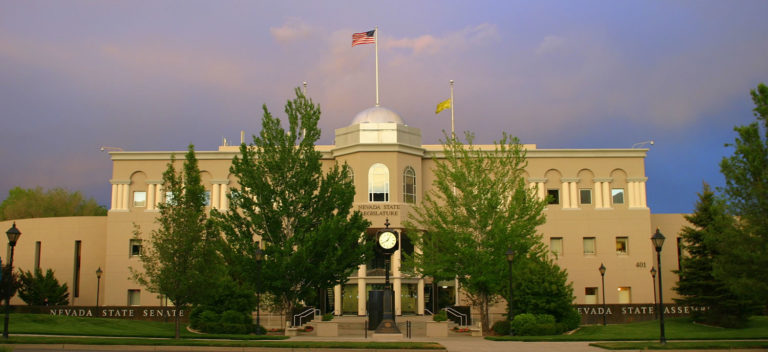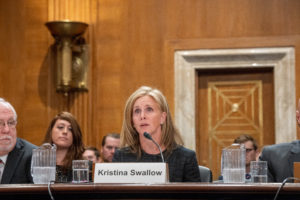
Kristina Swallow, P.E., has deep roots in the West. She grew up in Tucson, earned a B.S. and M.S. from universities in Arizona and Nevada, and served as an American Society of Civil Engineers (ASCE) Congressional Fellow and legislative staff member for New Mexico’s Senator Tom Udall. Today, she leads Nevada’s Department of Transportation (NDOT). She spoke to ESAL about the facets of her career.
CK: You’ve had many roles so far, from a business owner and consultant to a lobbyist and a legislative aide for a senator. How did you end up in so many different forms of employment?
Swallow: I think that I was just taking advantage of opportunities, saying yes, and following things that sounded interesting. I moved to Washington, DC after applying for and receiving a Congressional Fellowship. My work up until that point had led me to having an interest about how policies were made that impacted the practice of on-the-ground engineering work. While I was there, I worked for the Senator Tom Udall. Near the end of the fellowship, I was discussing with the legislative director what I wanted to do before I returned home and realized that I wanted to continue working on significant surface transportation legislation -- MAP-21 -- and hopefully see it enacted.

CK: What is the MAP-21 bill, and what was your role?
Swallow: It was a surface transportation bill from 2012, and it stands for Moving Ahead for Progress in the 21st century. I served as a legislative aide for a Senator who served on two of the committees in the Senate that have jurisdiction over the surface transportation departments that are covered by that bill -- the Committees for Commerce, Science and Transportation as well as Environment and Public Works. My role was to understand what was going on in the legislation and advocate for his priorities to be included.
CK: After your work in DC as a fellow and staff for three years, how was the transition back to local government?
Swallow: It was totally different because I went from being in the policy space at the federal level to going back to the engineering/project management space at the City of Las Vegas. I soon moved up to Carson City and helped with our legislative session in a lobbyist role on behalf of the City of Las Vegas. But mostly that job was back to traditional project, program, and staff management. It was back to my roots. As for working as a lobbyist for Las Vegas, a lot of people assumed it would be the same as my role in DC, and while there were similarities and similar skill sets were required, it was different.
CK: What was being a lobbyist like, and what kind of skills do you need to be effective?
Swallow: In DC, lobbyists were approaching us with their thoughts and ideas, and we were vetting ideas and figuring out what might be a priority and what should be included in legislation. On the lobbyist side, you're the one doing the advocating. It's your job to make sure the elected officials understand your position and understand why it's important. I think on both sides, you really need people skills and communication skills. You need to understand the process and timelines because in both cases those are critical and can drive your positioning. The timeline piece is probably much more critical at the state level, at least in Nevada, because our legislature only meets every other year for 120 days.
CK: You've been on CNN, BBC, NPR, and you've testified before the US Senate Environment and Public Works committee. Can you describe the importance of those kinds of engagements?
Swallow: One of the challenges we have in my industry is that we're reluctant to engage in those public spaces. But it's critically important because as civil engineers we design the infrastructure that serves as the backbone of our economy and the backbone of our quality of life. Our work ultimately contributes to, or against, our public health. Civil engineers need to engage, whether it be in international, national, or local media. We need to help our elected officials understand what we need to ensure that infrastructure system can help drive our economy forward, and what happens if we don't.
CK: In February, you started as the Director of NDOT. Tell me about the position.
Swallow: My typical day is a lot of meetings, but my role is to oversee the agency and approximately 1,800 people with a billion dollar budget. NDOT is responsible for planning, designing, building, maintaining, and operating the state transportation system in Nevada. Although that does not include the county roads or the city roads, I think the statistic is we have 20% of the roads, but we carry over 60% of the traffic. I oversee that team doing that work and I have lots of conversations with various stakeholders on what their needs are and what they're seeing in the roads, and how to prioritize their projects.
CK: What’s unique about the civil and environmental engineering space in Las Vegas?
Swallow: The city is still very young, but growing rapidly. It's a matter of staying caught up. We’re up-to-date technically, but staying caught up with the community as it continues to grow is challenging. Resources are always limited, so how do you program the resources to make sure that you're keeping up with the demands that growth requires? But also, while it is a young city, some of the infrastructure is getting to the point that it's beyond its useful service life. The maintenance of older infrastructure is a problem across the nation. In Las Vegas, the infrastructure is pretty good but we need to start figuring out how to balance that and generate more revenue.
Do you have a story to tell about your own local engagement or of someone you know? Please submit your idea here , and we will help you develop and share your story for our series.